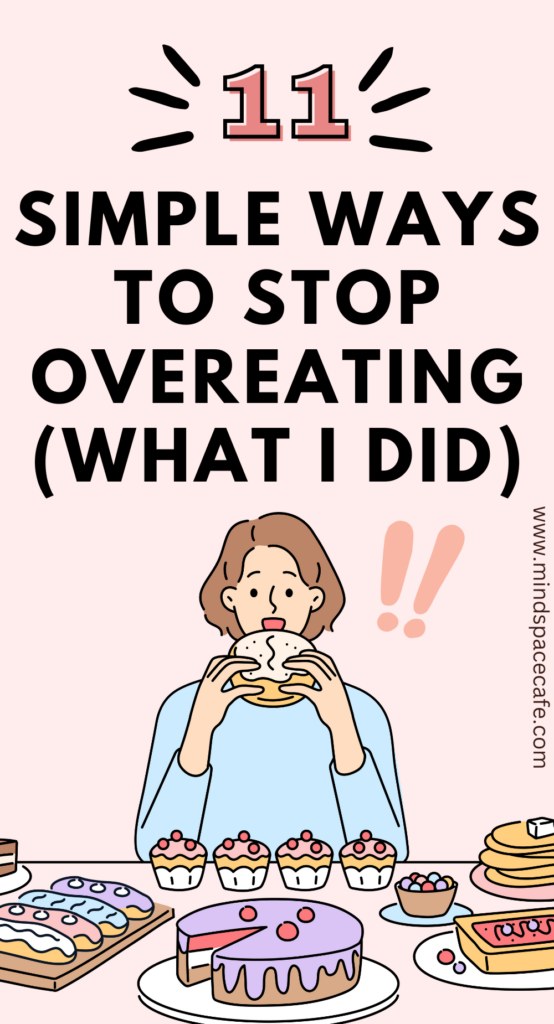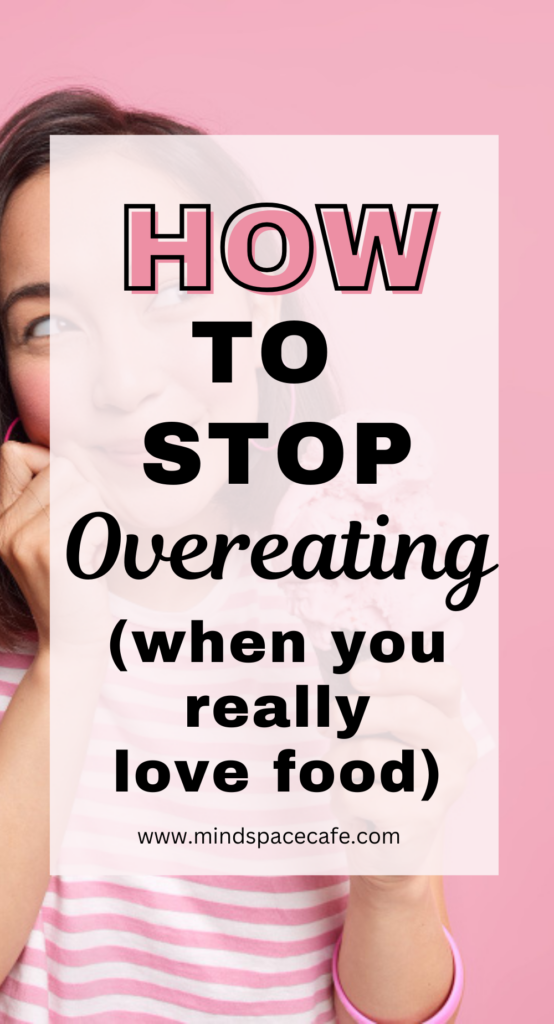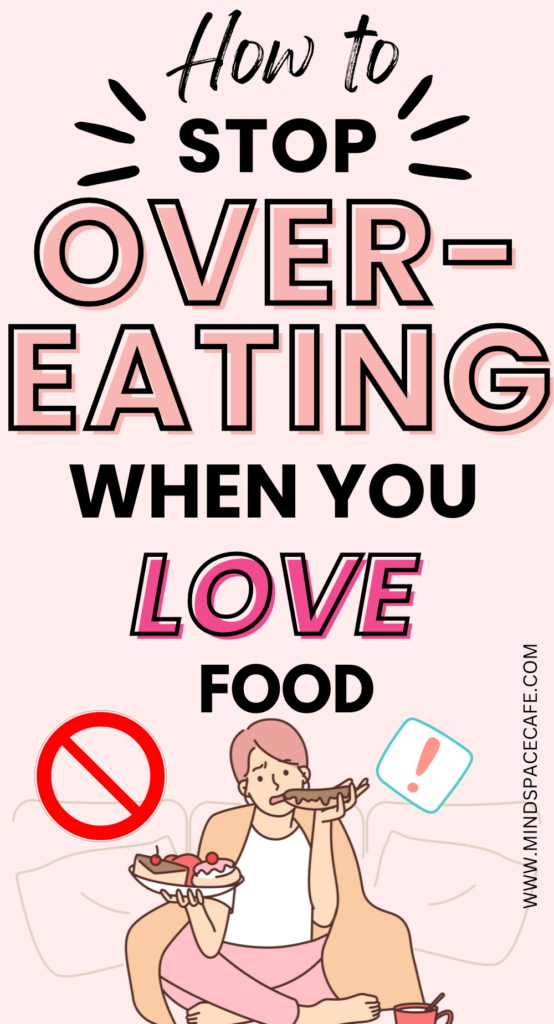This is something very personal because I have struggled with overeating for years.
All my life, I’ve eaten more than people around me and people would often get surprised when I’d repeatedly say “I’m still hungry” right after a full and balanced meal.
Since I was an only child with parents who worked full-time, my parents never restricted my food/snacks.
I ate a lot of junk food growing up.
And I had a fast metabolism.
But as I neared my 30s, my metabolism slowed down and I found myself lethargic and slow overall.
I noticed my friends being able to walk more than me, while I’d tire easily.
I realized my partner was slowing down for me while we were doing the most basic and easy trek and I realized something had to change.
I also have a habit of packing food with me wherever I go, something I had to be more mindful of.
I’ve taken a few years to become more mindful of eating and it’s not a 1-day process.
Remember, you’re rewiring your brain entirely – especially if you’ve struggled with this for years.
So, please give yourself some grace.
This is why I’m writing this post – because I’ve faced this problem and taken time to
Let’s dive in.
This post contains affiliate links, meaning I may make a commission at no extra cost to you if you decide to click on a link and purchase something. Click here to read the full disclaimer.
1. Understand your triggers

The reason I say this is because everybody is built differently.
You cannot solve this problem until you discover why you’re overeating and what is causing you to overeat.
Maybe it’s emotional or environmental?
Some people eat when they’re stressed. Some eat when they’re bored. Some eat due to social situations.
I eat when I am bored or need to de-stress.
I look for fatty/savory foods and I crave deep-fried food mostly.
If you’re unable to identify it or are having trouble, keep a journal and write down everything you’re feeling.
This requires inside work- I know, but this is what will help you once and for all.
It will help you become self-aware.
2. Eat more protein and healthy fats
If you eat a good and satisfying meal, you shouldn’t feel hungry in the next 3-4 hours.
If you do, then your meal wasn’t well-balanced.
Not all foods satisfy hunger equally.
If your meal was carb-heavy (please note carbs aren’t bad, but they should be complemented with proteins and vegetables), then you’ll feel hungry sooner because of the glucose spike in your body.
Proteins and good fats keep you full for so much longer.
This helps curb your appetite and not feel hungry sooner.
High-protein foods include:
- Eggs
- Beans and other pulses (I recommend looking up easy and quick recipes)
- Greek yogurt (you can add berries/dark chocolate to make it more palatable)
- Lean meats/soy
Good fats include:
- Dark chocolate (in moderation)
- Olive oil (especially when you’re making a quick stir-fry or salad dressing)
- Nuts like cashews, almonds, walnuts and pecans
- Avocado (go crazy with it)
- Tofu (this is rich in polyunsaturated fat and is a good source of protein for vegetarians and vegans)
- Fatty fish like salmon, tuna and sardines
3. Never, ever skip a meal

If your brain ever tells you to skip a meal because you had a big meal for breakfast, tell it to shut up.
Skipping meals leads to extreme hunger and this will result in overeating later.
You also don’t want your body to go into starvation mode and hold on to more fat and water – so don’t do this, it’s such a bad idea.
And I know it happens to all of us because our brains are naturally self-destructive like that.
Eating regular balanced meals will keep your blood sugar levels stable and reduce the temptation to binge-eat.
The goal is to become healthier – not do a quick fix and lose weight unnaturally.
4. Drink a lot of water
If you’re like me and hated water all your life, you have to suck it up and learn to love it.
Our bodies are 70% water apparently and it still thirsts for more.
Talk about greedy.
But here’s the thing, our bodies are dumb. It sometimes confuses thirst for hunger.
Drinking just 1 glass of water before a meal will help you eat less – trust me.
And drinking water throughout the day will help you stay full and water actually helps you in so many other ways.
- It will help your body digest food better.
- It will flush out all the toxins and help you clear your acne
- Staying hydrated will also help you manage hunger cues better
So drink water from a fancy bottle or get this bottle with a fruit infuser that you can add chopped fruits and enhance the taste.
Do anything you can to fall in love with water.
I actually keep “drink 2.5L of water” in my daily checklist and I update how much water I’ve consumed because I don’t trust myself.
It doesn’t come naturally to me to drink water.
So, hold yourself accountable and drink enough water your body needs.
5. Manage stress

I know this doesn’t sound serious but stress really is one of the most common triggers for eating because it leads to cravings for comfort foods.
And most of us use food as a reward – it helps us feel better so I get it.
But if you can control stress, you can control a HUGE part of your overeating and become more resilient.
So, try stress management techniques like meditation, journalling (this one works for me), exercise, or even talking to loved ones or playing with your pets and see if it helps.
I’ve also found that reading is a great stress-buster.
When I hear another voice (even in the form of a book), it helps me know I’m not alone.
The idea is to curb emotional overeating.
And doing this will really help you stop this habit once and for all.
6. Be mindful of eating
So, I’ve tried this method, and it works.
What I’ll do is:
- I’ll keep the big casserole with the cooked food in the kitchen and add veggies to my plate first before adding the main meal (like pasta/rice and curry) and walk away from the kitchen to my dining table (so that the food is out of sight)
- I’ll eat without watching TV and try to focus on chewing my food slowly while focusing on the flavors
- After I’m done eating, even if I’m still hungry, I’ll wait for 5 minutes before I take a second helping – this helps me eat only if I’m hungry.
And trust me, this helps.
Don’t scroll on your phone or watch TV while eating – this is a hard habit to break, I know. But finish your food before watching TV.
Because when we’re distracted, we tend to overeat.
7. Plan your meals in advance
Doing this will change your life.
Initially, it is very cumbersome.
But planning your meals actually cuts down on how much you eat.
How?
Because when your fridge is empty, you’ll start rummaging for snacks or worse, ordering takeout.
Both aren’t a good substitute.
It’s okay if you don’t feel like eating what you’ve prepared, but at least you’ve reduced the temptation of eating out or eating something unhealthy.
So, I usually plan my meals a day in advance or during the weekend – I’ll also do the grocery shopping and look up some tasty recipes on Instagram because they’re so easy to make.
For me, the path of least resistance is the easiest path to follow. So, I’ll make easy recipes (look for college recipes, or easy-to-make 15-minute recipes on Pinterest/Instagram).
8. Don’t restrict yourself but have a balance

Unless you have a specific food allergy like how I do with shellfish and soy, don’t cut out any foods.
Let’s say you like cookies.
Have one or two, that’s okay.
But don’t have 1-2 after every meal – that might be taking it a bit too far.
I had a thing for chocolate chip cookies and I always had a whole box after dinner every single day.
I cut it down to 2 cookies every night.
I eventually switched to homemade cookies and they tasted better.
I slowly switched to dark chocolate and now I am comfortable going without dessert completely.
This took me years but seeing how far I’ve come, I feel so proud.
I still eat chocolate and chocolate chip cookies, I just don’t do it that often – I only do it around it when I want to and that craving doesn’t come that often.
Don’t ever cut out foods you love, just have a balance.
Let’s say you like pizza!
Eat pizza once a week, but you don’t have to binge every day.
Try to eat whole foods 80% of the time. Eat whatever you want 20% of the time. =)
9. Include a fiber source with every meal!
Fiber helps you lose weight.
How?
Fiber is more filling so it helps you feel satisfied for longer periods.
This means you eat less because you feel full for longer.
It also reduces calorific absorption (it binds with fat and sugar molecules in the digestive tract), which means you absorb fewer calories which ACTUALLY helps you with weight loss.
Some fibre foods you can include in your meals are:
- Vegetables like brussels sprouts, broccoli, carrots (stir-fried are my favorite)
- Fruits like berries, oranges, bananas (you can add them to salads or have them with yogurt)
- Legumes like lentils, black beans, chickpeas, and kidney beans (I love them in curries with coconut milk, but you can also make soups, stews, and salads with them)
- Nuts and seeds like almonds, flaxseeds, sunflower seeds and walnuts
10. Get enough sleep

If you’re not well-rested, your hormones will be out of whack.
And your hunger hormones will make you overeat because it will increase your appetitive and cravings for high-calorie foods.
Ensure you get 7-9 hours of good-quality sleep.
Everybody needs different hours.
My partner is very happy with 6-7, but I need 9.
Women in general need more sleep than men.
Do this for you. And don’t drink caffeine to subdue your sleep and stay awake longer – I’ve done that and it only makes things worse in the long run.
11. Listen to your body
Eat slowly.
Don’t be in a rush to eat.
I always gobbled down my food (I still do this sometimes out of habit) within 30 seconds to a minute.
I’m one of those people who finishes their popcorn before the trailers are over.
And believe me, it’s a horrible habit.
Because when your stomach is full, it takes time for the signal to reach your brain.
This is why people say it’s important to eat slowly.
You may actually be full, but because you’re eating so fast, you’re unable to see it.
Learn to recognize the difference between hunger and other cues like boredom/thirst.
Sometimes, you might just want to taste something – it’s called taste hunger.
What if this doesn’t help?
If none of these methods have worked for you or there is something deep down that is bothering you, meaning your overeating is dependent on some deep psychological issue, I recommend getting help.
If it’s a persistent issue, you might consider attending therapy or speaking to a nutritionist.
I am currently speaking to one and she’s really helped me understand the importance of good whole and natural foods.



Here are a few more posts that you might enjoy!
- The 1% rule: how to Improve yourself every day in 10 minutes
- 55 simple ways to comfort yourself without eating
- 20 quotes to help you wake up early
- How to Stop Overanalyzing Everything
- Finding peace: How to stop thinking about someone who has hurt you
- 7 Tiny Habits to get you out of your Lazy Girl Era
- How to not let things bother you











